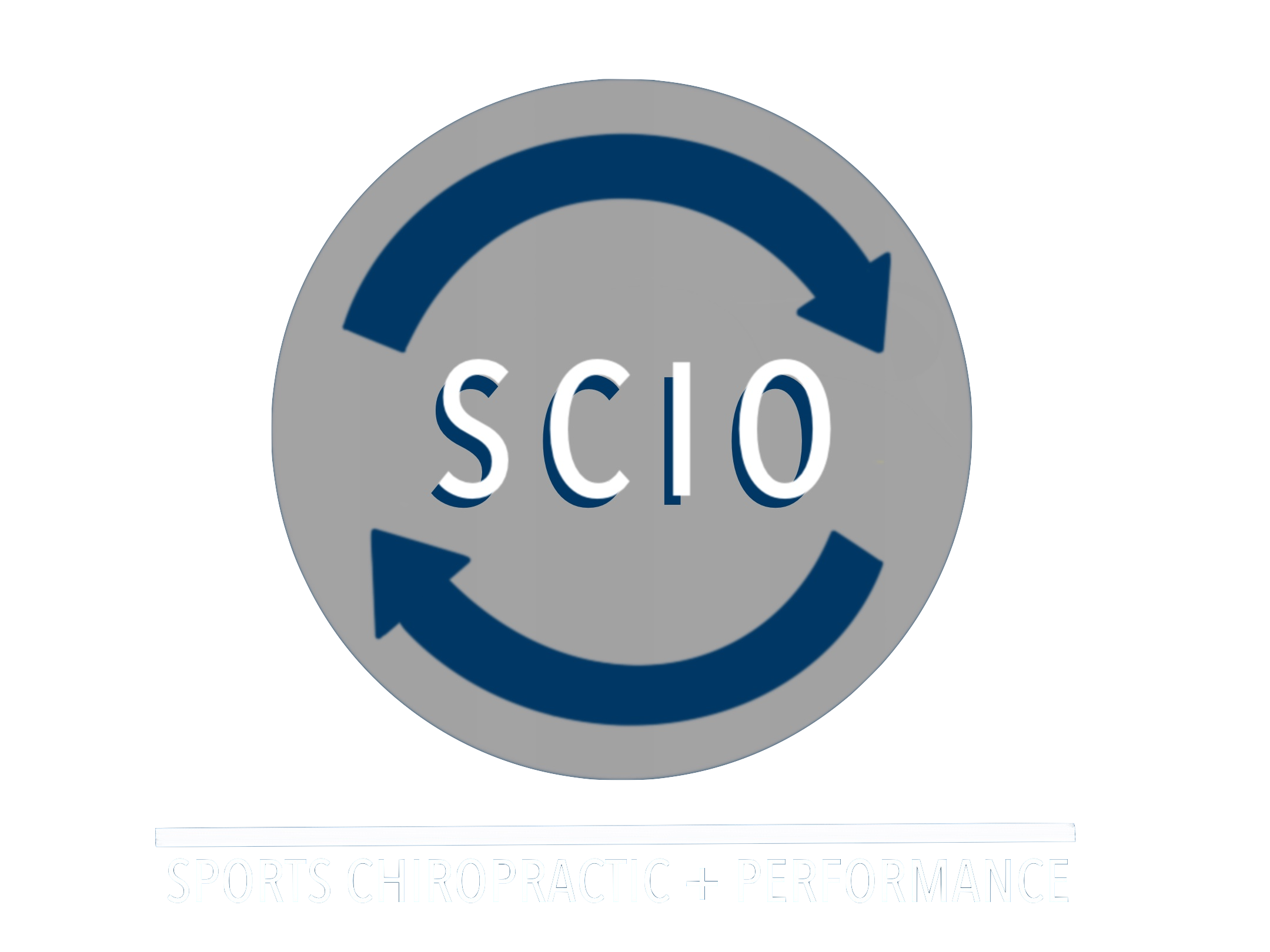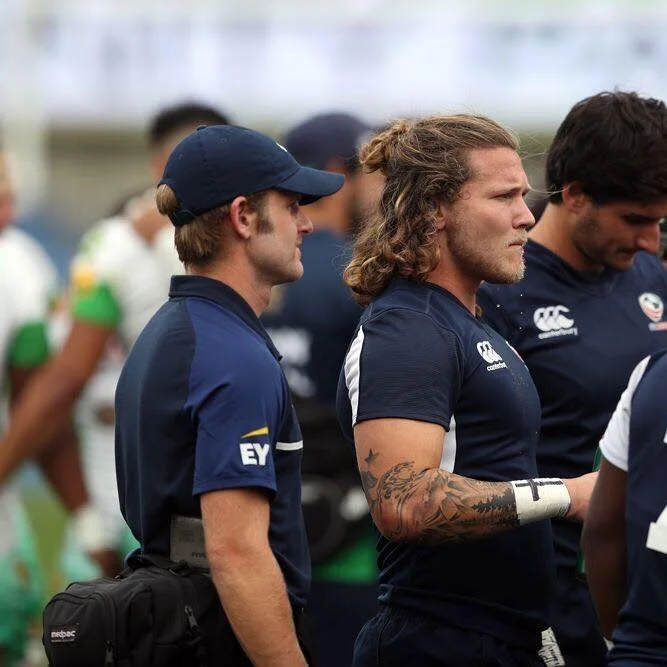Life as a Rugby Athletic Trainer with Chris Belmonte, ATC
I’m super excited to share my conversation with Chris Belmonte, ATC. Having both worked on medical staffs for Pacific Rugby Premiership teams, OMBAC and Life West, Chris and I connected when our respective teams faced off last year in San Francisco. Knowing that I would soon be moving back to San Diego to practice, we kept in touch.
Like many professionals working in sports medicine, Chris experienced several injuries in his playing career. Again, like many sports medicine professionals, it was a good clinician that inspired him to pursue a degree in athletic training. “Grew up playing a bunch of different sports - hockey, baseball, I got hurt a lot. I had a really good physical therapist who saw my interest in sports and injuries and kind of nudged me in the right direction.” A New Jersey native, Chris attended Kean University before accepting an offer to move cross country to San Diego at the Chula Vista Elite Athlete Training Center. Formerly known as the Chula Vista Olympic Training Center, the Elite Athlete Training Center is home to the United States National Rugby Sevens Team, among other olympic sports.
Being a former team sport athlete, Chris naturally meshed with the rugby team and spent most of his time working with both the men’s and women’s programs. Not having experience with rugby athletes before, Chris noted that the biggest attraction to the team and what he thinks sets them above other programs is the culture behind the squad. “I moved out here, like, a year and six months ago and knew nothing about rugby. When I got to the OTC (Olympic Training Center), they had to tell me what sevens was. What I learned about the game was like, yeah it was an awesome sport, but it was more so a culture, it was a family - they seemed like they were literally a family there. They were close with everyone, did everything together, they seemed like a really close-knit family,” Chris states. “I seemed to get on well with them too, because really no other team invited me out to their practices (laughs),” he joked.
The resources available to USA Sevens Rugby players at Chula Vista have incredible resources available to them at the center and their results show what American rugby is capable of with support. According to World Rugby, the governing body of rugby union and rugby sevens internationally (which Team USA competes in), USA Men’s Sevens and Women’s Sevens both finished last season ranked 2nd in the world. When describing the medical support offered to USA Sevens players, Chris had this to say, “The day to day medical operations at the center were conducted by sports chiropractors and high-level athletic trainers. There are referral networks as well and we even had an Orthopedic specialist come by monthly. All of the staff are vetted and supported by the US Olympic Committee. Between elite clinicians, strength and conditioning coaches, and more, you get extremely effective diagnostics and everything has a trackable metric. The average sevens athlete runs about thirty kilometers per week, they train in a full contact environment, and they travel nine months out of the year. They need all of the help they can get.”
Chris with the USA Collegiate All-Americans at the 2019 RugbyTown Sevens.
Chris’s tenure at the Chula Vista Elite Athlete Training Center eventually came to an end, but not before catching the attention of the USA Rugby Medical Staff. “They really took me under their wing. When my time was coming to an end, they pulled me aside and told me hey, it’s a really good sport and you have a future in it. Long story-short, I gave them my resume and told them that I wanted to stay in San Diego.” Chris has since worked a slew of USA Rugby events consisting of developmental camps, High School and Collegiate All-Americans, and more. “Over the past year, rugby has taken me to Victoria (Canada), Glendale (Colorado), and, through the grapevine, OMBAC came into the picture. Rugby is such a small community that, things just kind of happen. Working with OMBAC has let me kind of keep my feet wet with the game. Treating rugby injuries has given me a career!”
When asked about the conditions he works with at his commitments with OMBAC, Chris shed some light on the reality of working with one of the top amateur American rugby clubs for decades. “OMBAC is a great program with a dedicated history in San Diego and beyond, but they’re still not a professional program. There is a huge financial need in American rugby in general. With funding problems, it’s not always easy to get the management, medical, or supporting roles compensated. With field fees, equipment upkeep, etc., medical funding isn’t necessarily at the top of the list. Most clubs stress about paying the bills year by year, they’re not putting money away for their own AED (automated external defibrillator), they’re covering player dues. It honestly breaks my heart sometimes when we run into tough situations with the guys. Some of the players don’t have health insurance or they have other barriers to getting the care that they need. These are guys that help you pack and unload equipment, they’re humble on and off the field, and they take care of you and each other - you want to do everything you can for them and it sucks when your hands get tied.”
Chris after jersey presentation with the USA High School All-Americans, 2019.
On top of his commitments with the rugby community, Chris also works as the head athletic trainer for a high school in San Diego. When asked to compare the different environments, Chris had this to say, “In both populations, you have to dig a bit to get information out of them. Like you know, there’s a difference between being hurt and being injured. Also, you find that athletes from both populations hide or fabricate injuries. The high school kids may not actually want to play their sport, whether it be pressure from the parents or something like that, but they’re not hurt. The rugby player may not want to play in a lower fixture or friendly, and all of a sudden they tweaked their ankle. On the flip side, both populations hide injuries if it’s a big game or if they have supporters or something. You really have to dive into the psyche of the athlete sometimes.”
Touching on the topic of sports medicine in the high school environment, Chris plans on developing a course for his institution. Rather than focus on his scope of athletic training, Chris wants to touch on different roles in sports medicine. “I think it’s important to expose the high school kids to potential career paths on a superficial level - just enough to excite them. You’re never going to dive in deep enough to do any justice for a particular scope, there’s just not enough time. I want to establish pathways and open up exposure to more than just athletic training. Sports chiropractors, nurse practitioners, physicians assistants - all would be great options with unique scopes.”
Wrapping up the interview with Chris, the last topic covered involved what upcoming plans he had in his professional life, “I just worked a High School All-American series against Team Canada (match recaps and footage can be found here). It’s great seeing some familiar faces and it’s always exciting seeing the new players and talent that are brought in. My time will be split between my high school commitments and OMBAC is full go by February.”
Chris can be found working the sidelines at OMBAC’s home pitch at The Little Q, he frequents surf spots across San Diego, and loves a Better Buzz Coffee. His final remarks for this interview are, “Shoutout to USA Rugby for giving me a career!”
You can follow Chris on Instagram @cjbelmonte or click here.


